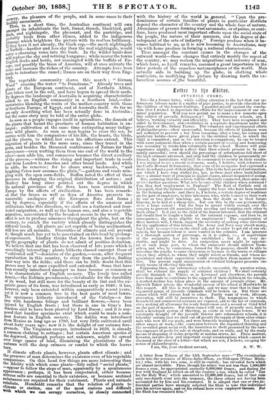fritrr In flit Etitor.
JUVENILE CRIME.
SIR—In a former letter, while calling attention to the fact that our re- formatory labours make it a matter of pure justice, to provide education for the children of the honest destitute, I guarded myself against the conclu- sion that I wished to depreciate the efforts for the improvement of our cri- minal population. Will you now permit me to make a few remarks upon this subject of juvenile delinquency? The reformatory schools, are, I believe, working valuably and efficiently. They have been recognized and aided by Government, and established as a separate department under the inspection of Mr. Sidney Turner. The voluntary and experimental efforts of philanthropists—often unsucessful, because the effects of kindness were not sufficient to prevent a boy from resuming, after a time, his roving and predatory habits—have given place to the certified school, to which the child is committed; and as his detention is compulsory, he can be treated with more judgment than when a certain amount of coaxing and humouring was necessary to retain him voluntarily in the school. Masters will gain experience rapidly, and in a short time these schools promise to be emi- nently successful; even should the percentage of reformations fall short of the high estimate advanced, and only half the children be permanently re- formed, the institutions will still be economical to society in their results. I was rejoiced to see a recent statement, made, I believe, with reference to the Castle Howard Reformatory, that some of its occupants had expressed a desire to refund a part of their pilfering,s. This is the best proof of reformation, one which I have long wished for, but, in these days when bank failures show a similar want of principle in higher classes, almost despaired of seeing. But, assuming that the schools will be efficiently conducted, there arise one or two further questions. What is to become of the children when reformed ? Can they find employment in England ? The Earl of Carlisle said at Liverpool, that the farmers readily employ the boys who have been trained in the farming schools : and there is, I believe, a certain degree of readiness on the part of employers, to hire labourers, who, while trained to their work by one or two years' teaching, are, from the doubt as to their future honesty, to be had at a cheap rate. But can this be the case permanently, or to a large extent ? Can the boys be spread widely enough over the country to prevent old associates from meeting and tempting each other to fresh crime ? Is it just to the child of the honest labourer, that the criminal lad should first be taught a trade at the national expense, and then be, in consequence, the more eligible for employment ? The consideration of these matters will, I think, suggest the necessity of seeking other directions for the application of this labour. The Army and Navy may absorb many, but I look to emigration as the chief aid, not in order to get rid of our cri- minals, but because labour is more wanted in the colonies. I am ignorant if a thorough system of patronage, as it is called, i.e., of supervision of the emigrants, has yet been established ; but it is very de- sirable, and might be done. An emigration agent might be appoint- ed at each large port, to whom the emigrants should address them- selves, and who, by connexions, formed for the purpose, should be able to introduce the youths to some clergyman or layman in the towns or villages where they settled, to whom they might resort as friends, and whose ac- quaintance and silent supervision would strengthen them against tempta- tion. The present rapid organization of colonial bishoprics presents one ready means of effecting this end. Supposing then, our reformatory schools successful, the question arises, shall we exhaust the supply of criminal children ? We shall certainly greatly diminish it. Where, as in Liverpool and elsewhere, the parents have been made to contribute to the support of their children in the schools, a marked decline has taken place in the amount of juvenile crime. Mr. Barwick Baker attests the wonderful success of his school at Hardwicke an this respect. All this is very hopeful, and we may trust that in time the organized gangs of juvenile criminals will be broken up. But there are causes which will always lead to crime. Partly want of work, idleness, starvation, will still be incentives to theft. The temptations to which household and commercial servants are exposed, add to the list of criminals, even making all allowance for ready forgiveness and a second or third trial on the part of masters. But these causes will not, if properly met, lead to such a developed system of thieving, as exists in our large towns. If we constantly draught off the juvenile thieves into reformatory schools, it is tolerably certain that we shall cut off greatly the supply of those elder crimi- nals who now Ali our gaols, and were formerly transported. Yet there are other causes at work,—the connexion between the organized thieving and the so-called great social evil, the incentives to theft presented by the care- less exposure of goods for sale at shopfronts, and on stalls, and by the ready means of disposing of stolen property at marine stores, &c. These matters, however, involve deep and important social considerations which cannot be discussed at the close of a letter—but which are not, I believe, escaping the notice of philauthropists.
I am, Sir, your obedient servant, A. W. W.


























 Previous page
Previous page